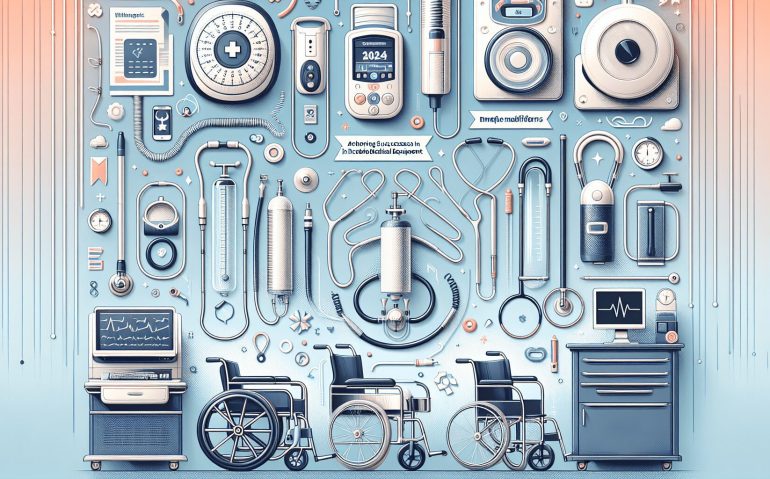
The Ultimate 2024 Guide to DME Modifiers: Achieving Success in Durable Medical Equipment

The accurate application of DME modifiers, is crucial for ensuring successful reimbursement for Durable Medical Equipment (DME). The Ultimate 2024 Guide to DME Modifiers sheds light on the significant role these modifiers play in medical billing, targeting a range of types including Modifier 59, XE, XP, XS, XU, CPT, NCCI, and HCPCS Level II modifiers. With the Centers for Medicare & Medicaid Services (CMS) introducing changes to the DMEPOS Fee Schedule for 2024, it’s more important than ever to understand the nuances of these codes and ensure compliance with the updated policies and fee schedule amounts.
This article will guide healthcare providers through the intricacies of commonly used DME modifiers, those specific to equipment categories, and the critical modifiers for maintenance, servicing, equipment replacement, and repair. We delve into the documentation requirements and the pivotal role of the KX modifier, aiming to help providers circumvent common errors and navigate top DME denial reasons effectively. With new codes added to the HCPCS file and adjustments in fee schedules kicking off from January 2024, this guide is poised to be an indispensable resource for the healthcare community.
Understanding DME Modifiers
Understanding DME Modifiers is crucial for accurately [billing durable medical equipment](https://wenour.com/frequently-asked-questions-about-durable-medical-equipment-billing/) services. These modifiers provide essential details that enhance the billing process and ensure compliance with healthcare regulations.
Purpose of DME Modifiers:
- DME modifiers are specifically used to provide additional information about the item being billed, such as its condition and billing context.
- They help clarify whether an item is new, used, or rented, which directly impacts the reimbursement process.
Examples of Common DME Modifiers:
- RR Modifier: Indicates that the equipment is rented.
- NU Modifier: Used when the equipment purchased is new.
- UE Modifier: Applies when the equipment purchased is used.
Importance in the Billing Process:
- Modifiers play a critical role in expediting claims processing and preventing claim denials. By providing specific details about the equipment, they help ensure that claims are processed efficiently and accurately.
- It’s important to note that not all medical supplies require modifiers; for instance, supplies like ostomy bags and syringes are billed without modifiers.
For healthcare providers looking to streamline their DME billing process, understanding and correctly applying these modifiers is key. Providers can benefit from partnering with experienced billing services like Wenour, which specializes in medical billing outsourcing, to navigate the complexities of DME modifiers effectively. This partnership can help in avoiding common billing errors and enhancing reimbursement strategies.
Commonly Used DME Modifiers
In the realm of Durable Medical Equipment (DME) billing, understanding and applying the correct modifiers is essential for compliance and efficient processing of claims. Here are some of the commonly used DME modifiers, categorized to aid healthcare providers and billing services, like Wenour, in navigating the complexities of medical billing:
Rental, Purchase, and Replacement Modifiers
- RR Modifier: Applied to items that are rented, ensuring claims are processed with rental agreements in mind.
- NU Modifier: Indicates the purchase of new equipment, crucial for claims involving new DME items.
- UE Modifier: Used when the equipment purchased is used, affecting the reimbursement process.
- RA Modifier: Applicable for DME item replacement due to non-repairable damage, theft, or loss, essential for filing claims for replacements.
- RB Modifier: Indicates replacement of a part of DME due to repairs, facilitating accurate claims for part replacements.
Specific Condition and Service Modifiers
- Modifier 52: Used when the service provided was less than the typical service expectation, impacting claim adjustments.
- Modifier 53: Indicates a procedure was started but stopped prematurely due to extenuating circumstances, critical for documenting incomplete services.
- Modifier KX: Signifies that required documentation supporting the medical necessity of the DME item is on file, a key modifier for compliance and audit readiness.
Modifiers for Specific Equipment Categories
- Modifiers RT and LT: Designate right and left for items like external breast prosthesis, orthopedic footwear, and other specified DME, essential for claims specificity.
- Modifiers BP and BR: Used exclusively for Complex Power Wheelchairs, indicating whether the beneficiary has elected to rent or purchase, which affects the terms of the claim.
Modifiers for Usage Frequency and Rental Periods
- KH, KI, KJ Modifiers: Specify the rental month of the DME item, from the initial claim to the fifteenth month, guiding the billing timeline for rented equipment.
- Modifiers for Oxygen Equipment: Include QE, QF, QG, QH, denoting specific oxygen flow rates and equipment types, crucial for precise billing in respiratory care.
By partnering with a seasoned medical billing outsourcing company like Wenour, healthcare providers can leverage expertise in the application of these modifiers to enhance their billing accuracy and compliance. This partnership not only aids in navigating the billing landscape but also helps in maximizing reimbursement while minimizing errors and denials.
Modifiers for Specific DME Categories
Durable Medical Equipment (DME) modifiers play a crucial role in specifying the conditions and contexts of equipment usage, which directly impacts billing and compliance. Here is a detailed breakdown of modifiers used for specific DME categories:
Inexpensive or Routinely Purchased (IRP) Items, Capped Rental Items, and Items Requiring Frequent and Substantial Servicing
- Mod 99: Modifier overflow, used when multiple modifiers are required to fully describe a service.
- Mod KR: Indicates that the DME is to be rented, essential for items under rental agreements.
- Mod KE: Used for items bid under round one of the DMEPOS Competitive Bidding Program, paired with non-competitive bid base equipment.
Oxygen Equipment Modifiers
- Oxygen equipment, crucial for respiratory care, utilizes specific modifiers to detail the provision and billing conditions:
- Mod KI: Applied for the second or third month rental, guiding the rental period and billing cycle.
- Mod KJ: Used for items like parenteral enteral nutrition (PEN) pumps or capped rental, from months four to fifteen.
Modifiers for Specific Conditions and Services
- Mod CG: Policy criteria applied, ensuring compliance with specific policy requirements.
- Mod CS: Cost sharing waiver for COVID-19 testing, highlighting adjustments made for pandemic-related services.
By understanding and correctly applying these specific DME modifiers, healthcare providers can enhance their billing accuracy and compliance. Partnering with a medical billing outsourcing company like Wenour can provide additional expertise in navigating these complex requirements, ensuring that both billing and service provision follow current regulations effectively. This partnership is particularly beneficial in managing the nuances of DME modifiers, which can often be a challenging aspect of medical billing.
Maintenance and Servicing Modifiers
In the realm of Durable Medical Equipment (DME) maintenance and servicing, specific modifiers are used to ensure accurate billing for services that are not covered under any manufacturer or supplier warranty. One such modifier is:
- Modifier MS: This modifier is crucial for the billing of six-month maintenance and servicing fees. It covers reasonable and necessary parts and labor costs which are not included in any warranty provided by the manufacturer or supplier of the equipment.
For healthcare providers and medical billing services, including those offered by Wenour, understanding the application of Modifier MS is essential. This knowledge helps in submitting claims that accurately reflect the maintenance and servicing work required for DME, ensuring that providers are reimbursed correctly without delays or denials due to improper modifier use.
By leveraging the expertise of a seasoned medical billing outsourcing company like Wenour, healthcare providers can navigate these complex billing requirements more efficiently. This partnership not only aids in managing the financial aspects of DME maintenance and servicing but also ensures compliance with billing regulations, ultimately enhancing the provider’s ability to deliver uninterrupted patient care.
Modifiers for Equipment Replacement and Repair
Modifiers for Equipment Replacement and Repair
In the complex landscape of DME billing, specific modifiers ensure the accurate processing of claims for equipment replacement and repair. Here’s a breakdown of essential modifiers and guidelines for their application:
Replacement Modifiers:
- RA Modifier: Utilized when a DME item needs replacement due to loss, irreparable damage, or theft. This modifier should be appended to the claim line of the item for a purchase or the first month rental claim for a replacement item.
- CR Modifier: Indicates replacements made under emergency conditions, emphasizing the urgency and necessity of the replacement.
Repair Modifiers:
- RB Modifier: Applied when only a part of the DME item requires replacement due to repairs. This helps in distinguishing between complete item replacements and partial repairs.
- LC Modifier: Denotes that the equipment is repaired and not replaced. This modifier should be appended to the HCPCS code for the repaired item.
Documentation and Compliance:
- When filing claims, it’s crucial to include detailed documentation such as the HCPCS code, date of purchase, manufacturer’s name, product name, model number, and the supplier price list amount of the repair item.
- Justification for repairs and replacements must be clearly documented to support the medical necessity and compliance of the claim.
- For replacements, documentation should include the reason for replacement and a new Certificate of Medical Necessity (CMN) if required.
By partnering with a medical billing outsourcing company like Wenour, healthcare providers can navigate these intricate requirements efficiently. Wenour’s expertise in DME billing can help ensure that claims are compliant and processed without delays, maximizing reimbursement and minimizing denials. This strategic partnership supports healthcare providers in maintaining a focus on patient care while managing the financial and regulatory aspects of DME services.
Documentation Requirements and the KX Modifier
Documentation Requirements and the KX Modifier
The KX modifier plays a critical role in DMEPOS billing, indicating compliance with documentation and medical necessity standards. Here’s a breakdown of essential guidelines and requirements for the effective use of the KX modifier:
Proper Application of the KX Modifier:
- General Usage: The KX modifier must be appended to claims for specific DME items like Glucose Monitors and Testing Supplies, only when the beneficiary is treated with insulin injections.
- Documentation on File: It signifies that all necessary documentation justifying the medical necessity of the DME item is available and meets the coverage criteria.
- Avoid Misuse: Incorrect appending of the KX modifier without verifying the existence of supporting documentation or coverage criteria can lead to claim denials.
Threshold and Compliance:
- Threshold Amounts for 2024: The KX modifier threshold for PT and SLP services combined, and separately for OT services, is set at $2,330, indicating that services above this amount are considered medically necessary and justified by the documentation.
- Audits and Reviews: The usage of the KX modifier is subject to audit by Medicare and other payers, ensuring compliance and proper billing practices.
Specific Guidelines for Rental and Ownership:
- Rental Period: For items under a rental agreement, the KX modifier should be included to reflect the 60-day rental period starting from the delivery date of the DME item to the patient.
- Ownership: It should not be used for items that are purchased outright; its use is restricted to rented items, with a signed rental agreement and proof of delivery required.
Partnering with a medical billing outsourcing company like Wenour can provide substantial support in managing the complexities of the KX modifier. Wenour’s expertise ensures that healthcare providers maintain compliance with billing regulations, effectively use the KX modifier, and avoid common pitfalls that lead to claim denials and recoupments.
Conclusion
Throughout this comprehensive exploration of Durable Medical Equipment (DME) modifiers, we’ve dissected the critical aspects that underscore the importance of accurate medical billing and compliance with the ever-evolving regulations and fee schedules. From navigating the complexity of common and specific DME modifiers to understanding the indispensability of the KX modifier and the nuances of documentation requirements, the guide underscores the pivotal role of these modifiers in ensuring streamlined billing processes and the successful reimbursement for healthcare providers. The intricate details provided aim to enhance the provider’s billing accuracy, ensuring compliance, and fostering a robust understanding of the DME billing landscape.
As the healthcare sector continues to evolve, the necessity for healthcare providers to partner with experienced billing services like Wenour becomes increasingly apparent. Such partnerships not only ease the burden of navigating the complexities of DME billing but also maximize reimbursement efficiency, minimize errors and denials, and allow providers to concentrate on delivering quality patient care. In this context, for those looking to enhance their DME billing processes and ensure meticulous compliance with billing regulations, we encourage you to . This strategic approach to DME billing, enriched by the expertise and support of Wenour, can transform the financial health of your healthcare practice, positioning it for success in today’s dynamic healthcare environment.
FAQs
What is the appropriate modifier for newly purchased durable medical equipment?
The NU modifier should be used for newly purchased durable medical equipment (DME). This modifier indicates that the equipment provided is brand new and has never been used before.
What are the key criteria for defining Durable Medical Equipment (DME) according to Medicare?
Medicare defines Durable Medical Equipment (DME) based on five main criteria: 1) The equipment must be durable enough to withstand repeated use. 2) It should be appropriate for use primarily in a home setting, though not exclusively. 3) The term “home” does not encompass hospitals or skilled nursing facilities. 4) The equipment should be primarily and customarily needed for a medical purpose, meaning it generally isn’t useful to individuals who are not sick.
What is the significance of the KX modifier in DME claims?
The KX modifier is used in DME claims to signify that the clinician has attested to the medical necessity of services that exceed therapy caps, and that this justification is documented in the medical records.
What purpose does the RR modifier serve in DME claims?
The RR modifier is used in durable medical equipment claims to indicate that the equipment is rented rather than purchased. This modifier is essential for specifying the rental agreement in the billing process.























